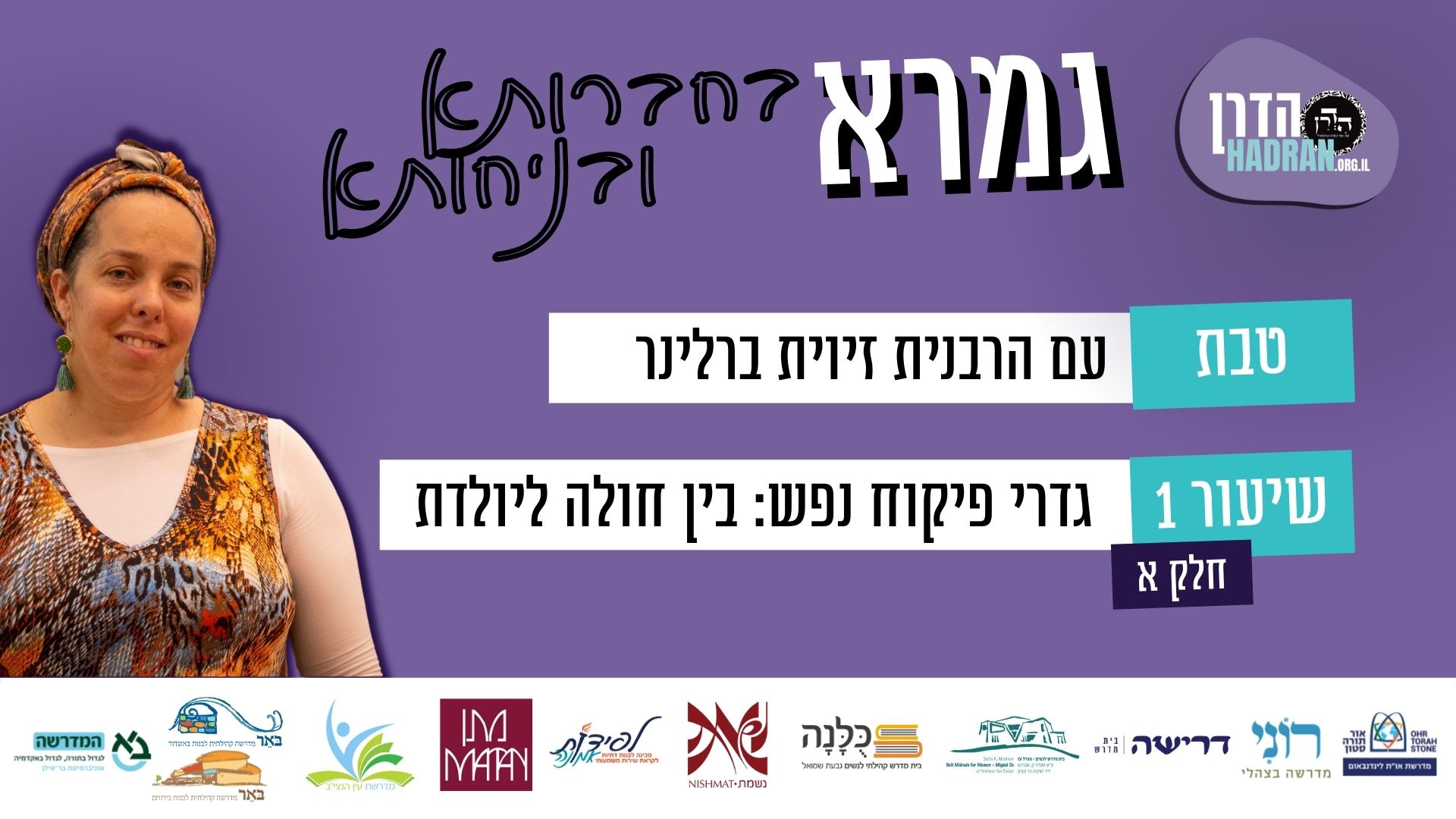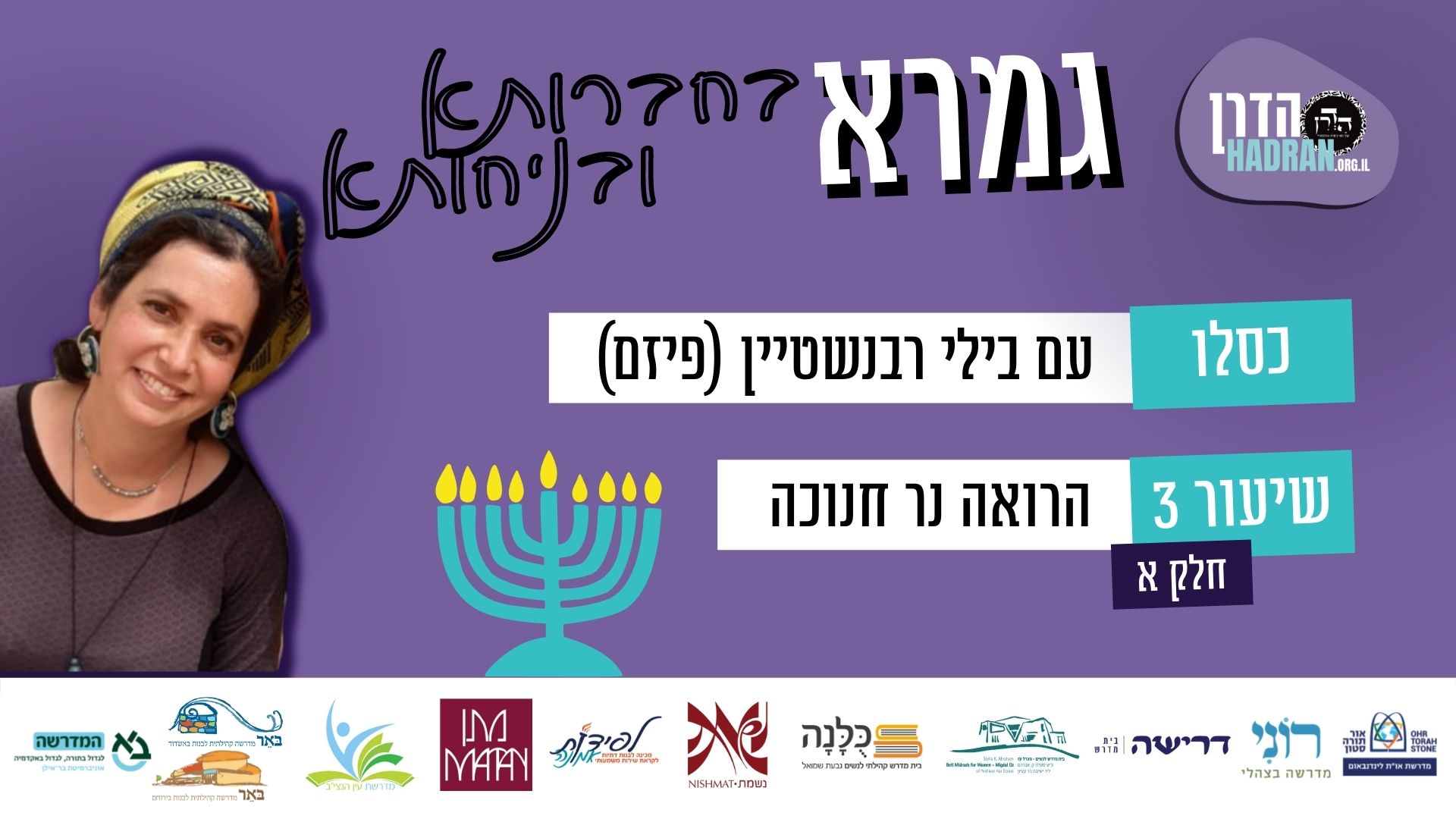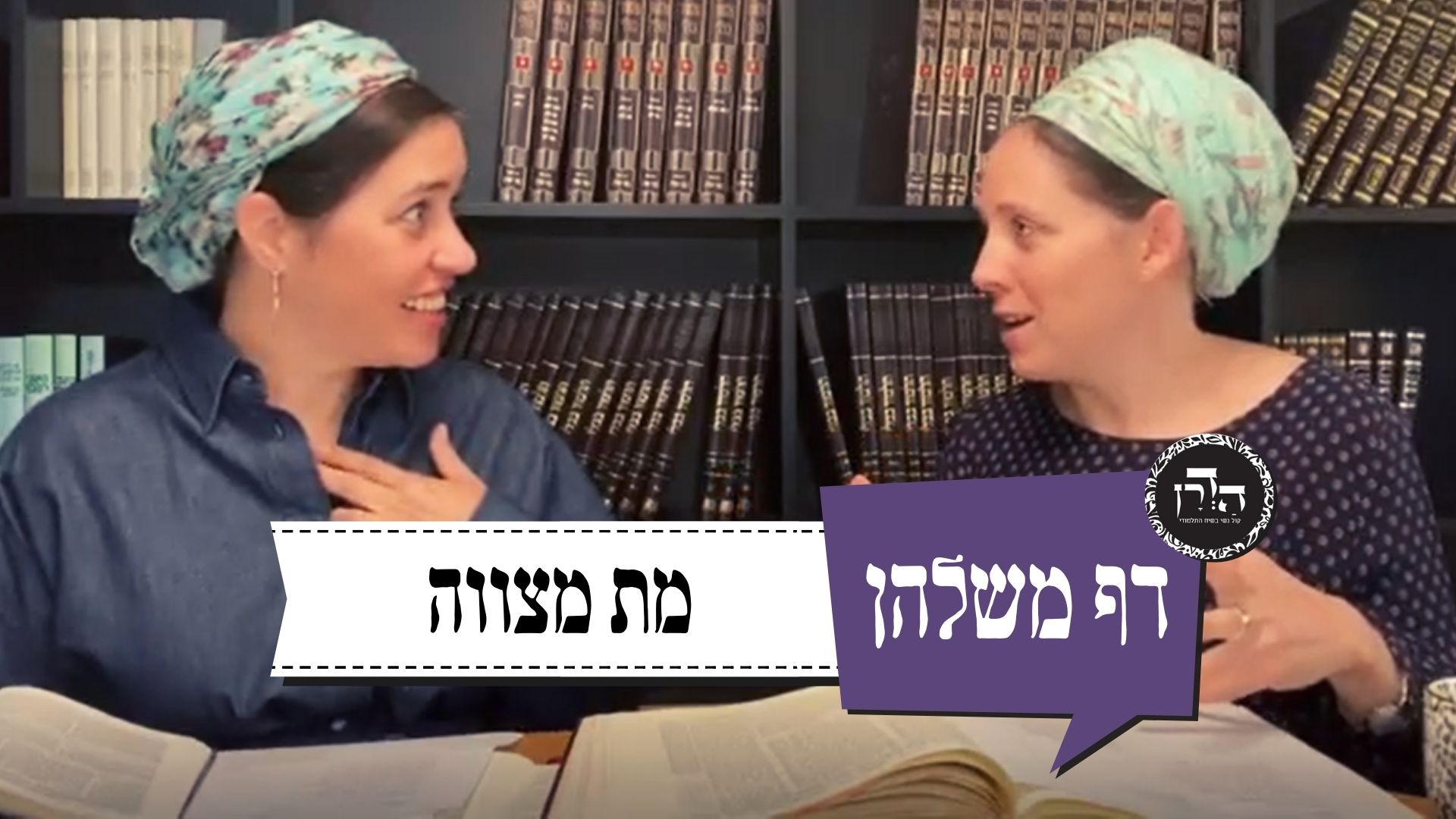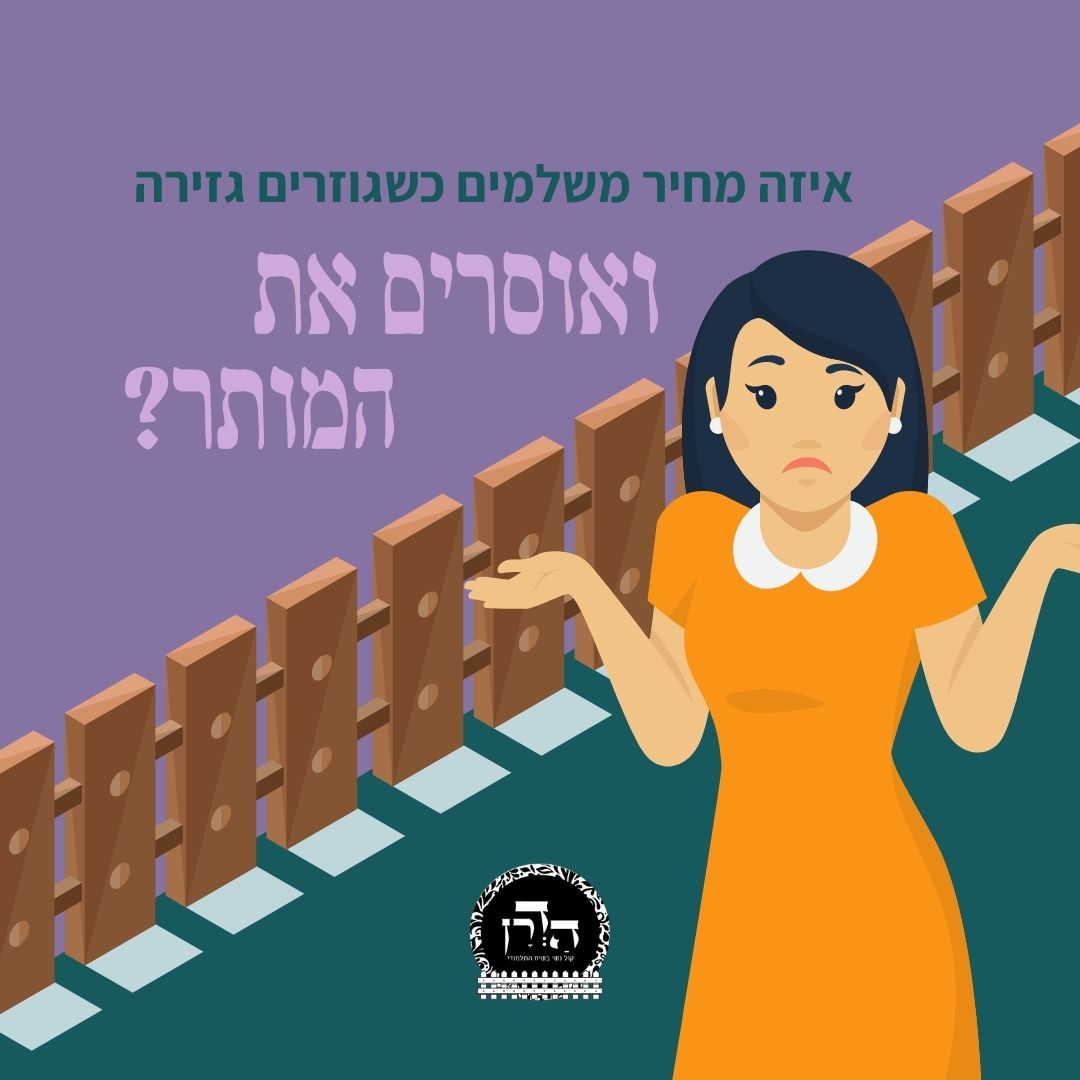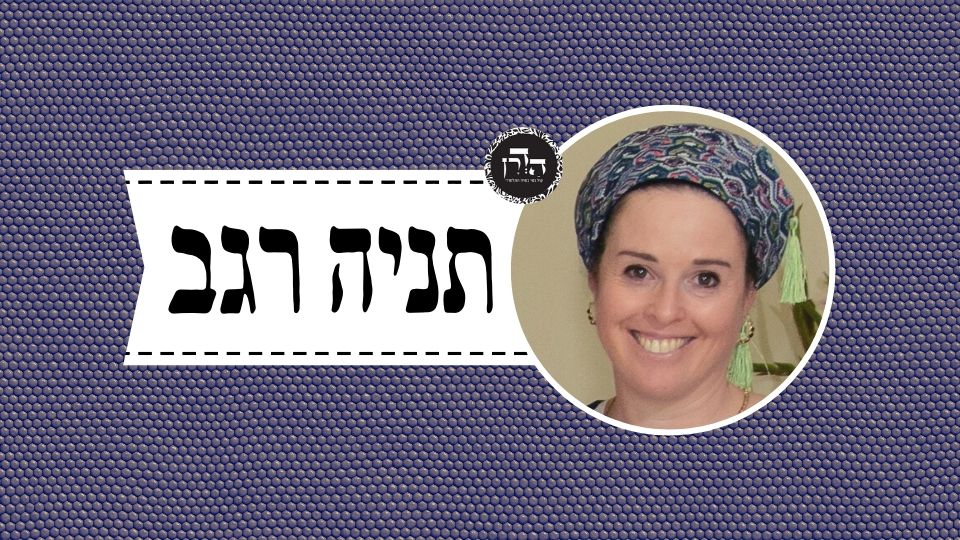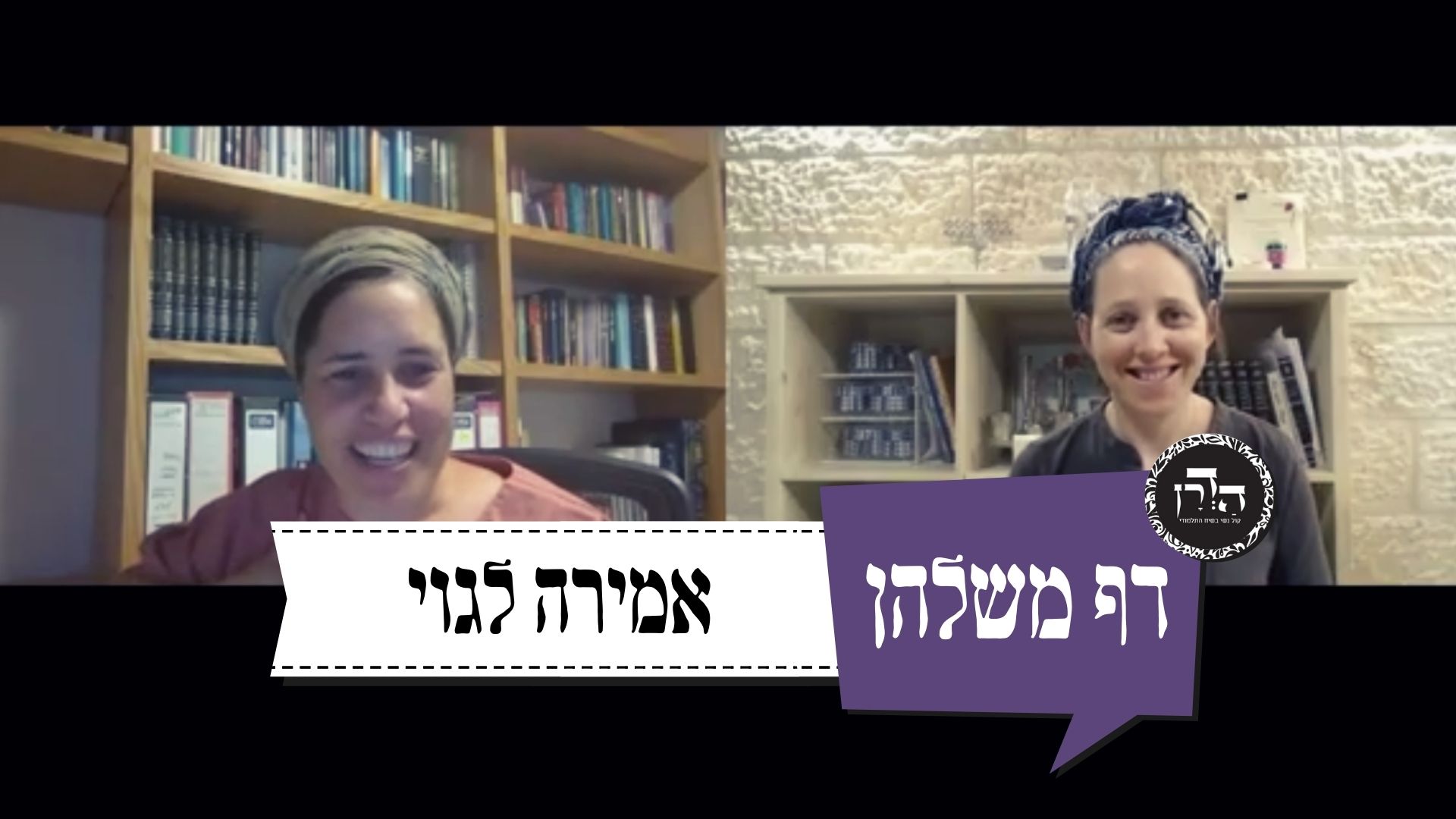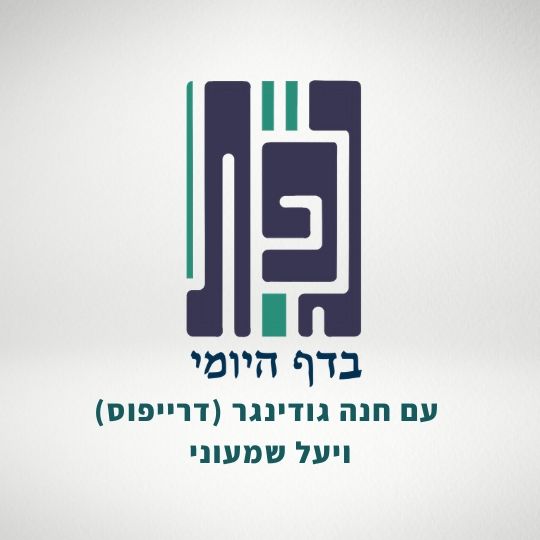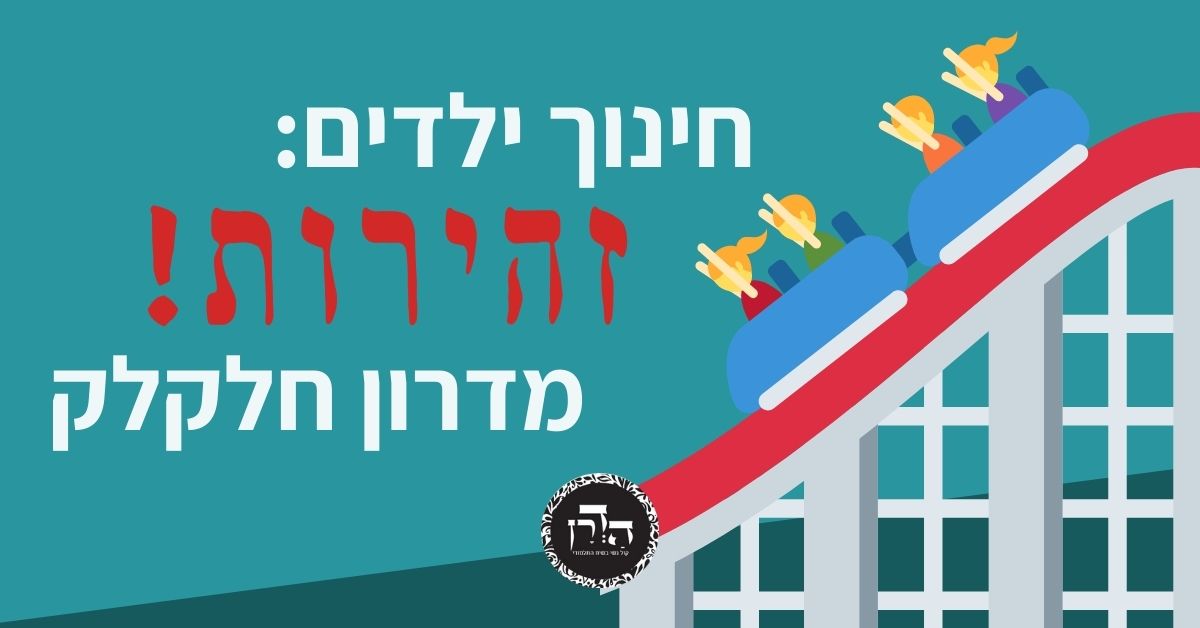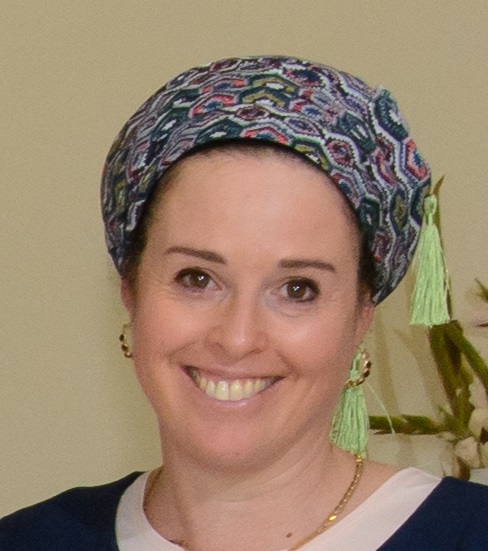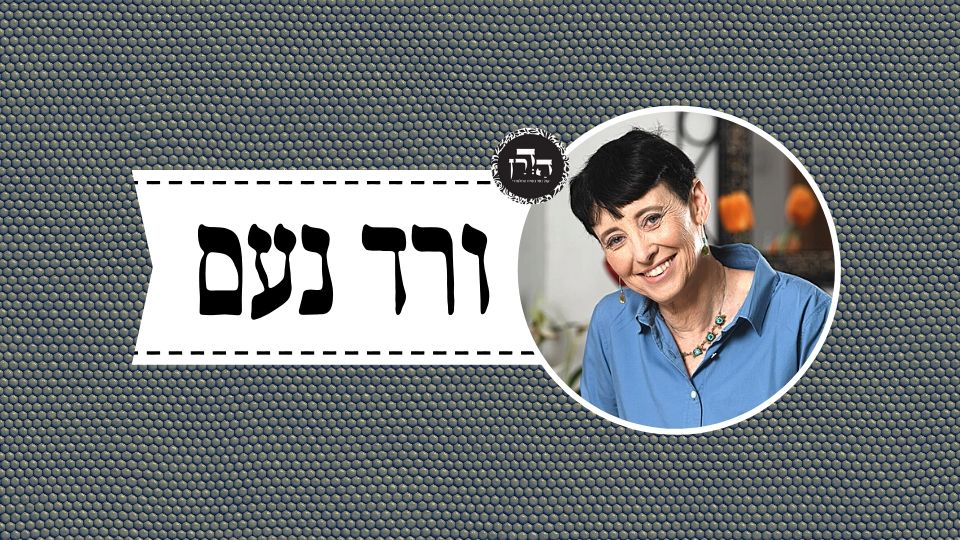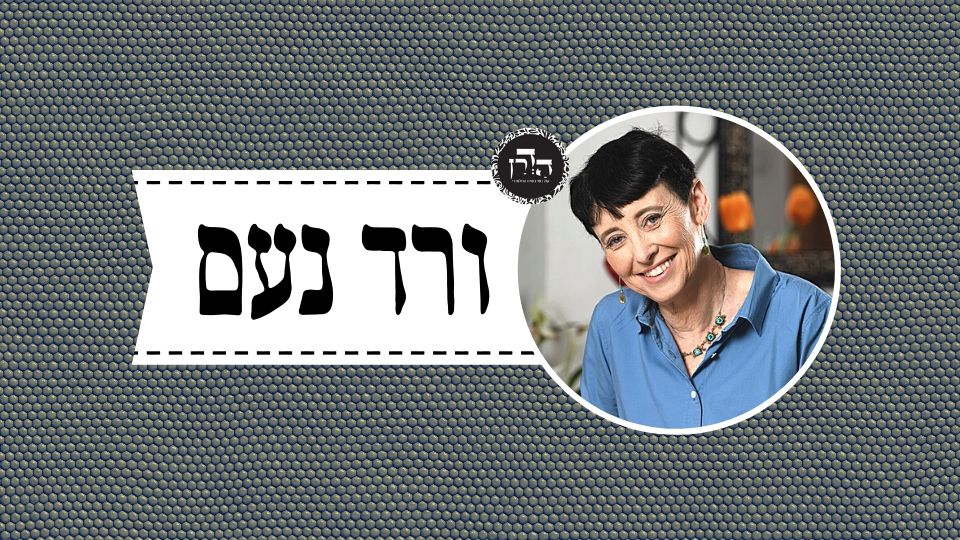שבת קיז
מִי דָּמֵי?! הָתָם — נַעֲשָׂה בָּסִיס לְדָבָר הַמּוּתָּר, הָכָא — נַעֲשָׂה בָּסִיס לְדָבָר הָאָסוּר! אֶלָּא הָכִי קָאָמְרִי לֵיהּ: אִם מַצִּילִין תִּיק שֶׁל סֵפֶר עִם הַסֵּפֶר, וְאַף עַל פִּי שֶׁיֵּשׁ בְּתוֹכוֹ מָעוֹת, לֹא נְטַלְטֵל עוֹר אַגַּב בָּשָׂר?! מִי דָּמֵי? הָתָם נַעֲשָׂה בָּסִיס לְדָבָר הָאָסוּר וּלְדָבָר הַמּוּתָּר, הָכָא — כּוּלּוֹ נַעֲשָׂה בָּסִיס לְדָבָר הָאָסוּר. אֶלָּא הָכִי קָאָמְרִי לֵיהּ: אִם מְבִיאִין תִּיק שֶׁיֵּשׁ בְּתוֹכוֹ מָעוֹת מֵעָלְמָא לְהַצִּיל בּוֹ סֵפֶר תּוֹרָה, לֹא נְטַלְטֵל עוֹר אַגַּב בָּשָׂר?!
The Gemara asks: Are they comparable? There, with regard to the Torah scroll, the casing is a base for a permitted object, i.e., the scroll itself, which may be moved on Shabbat; whereas here, with regard to the hide of the Paschal lamb, the skin is a base for a prohibited object, i.e., the flesh of the sacrifice, which may not be moved until nightfall because it may not be eaten until night. Rather, this is what they said to him: If one may save the casing of the Torah scroll along with the scroll, even if there is money inside it, why then may one not move the hide together with the flesh? The Gemara asks: Are they comparable? There, with regard to the Torah scroll, the casing becomes a base for a prohibited object and a permitted object; whereas here, with regard to the hide, it is entirely a base for a prohibited object. Rather, this is what they said to him: If one may bring a casing that has money inside it from outside in order to save a Torah scroll in it, why may one not move the hide together with the flesh?
וְהִיא גוּפָהּ מְנָלַן? אִילֵּימָא דְּמִדְּהֵיכָא דְּאִית בֵּיהּ לָא שָׁדֵי לְהוּ, אֵיתוֹיֵי נָמֵי מַיְיתִינַן — מִי דָּמֵי?! הָתָם — אַדְּהָכִי וְהָכִי נָפְלָה דְּלֵיקָה, הָכָא — אַדְּהָכָא וְהָכִי לִישְׁדִּינְהוּ. אֶלָּא אָמַר מָר בַּר רַב אָשֵׁי: לְעוֹלָם כִּדְאָמְרִינַן מֵעִיקָּרָא. וּדְקָא קַשְׁיָא לָךְ: הָכָא טִלְטוּל וְהָכָא מְלָאכָה — כְּגוֹן דְּלָא קָבָעֵי לֵיהּ לְעוֹר.
The Gemara asks: And from where do we derive this halakha itself? As it is not stated in the mishna, from where do we derive that it is permitted on Shabbat to bring a casing containing money from the outside in order to save a Torah scroll? If you say that from the fact that in a situation where the casing has money in it one does not throw it away but brings it out with the casing, when the casing is outside and has money in it, one may also bring the money along with it; is it comparable? There, with regard to the Torah scroll’s casing with money inside, if one tarries in order to empty the money from the case, in the meantime the fire might catch the Torah scroll and burn it; whereas here, with regard to bringing in the casing, in the meantime he could have thrown it away. Rather, Mar bar Rav Ashi said: Actually, it is as we said initially. The Sages equated carrying the Torah casing with flaying the hide of the Paschal lamb. And as for what was difficult for you, that here, with regard to the Torah casing, moving alone is involved, whereas here, with regard to a Paschal lamb, a prohibited labor is involved, it can be explained as referring to a case where one does not need the hide of the Paschal lamb. Therefore, he is exempt.
וְהָא אַבָּיֵי וְרָבָא דְּאָמְרִי תַּרְוַיְיהוּ: מוֹדֶה רַבִּי שִׁמְעוֹן בִּ״פְסִיק רֵישֵׁיהּ וְלָא יְמוּת״ — דְּשָׁקֵיל לֵיהּ בְּבַרְזֵי.
The Gemara asks: But Abaye and Rava both said: Rabbi Shimon concedes in cases categorized as cut off its head and will it not die, i.e., an action with an inevitable consequence. When an action has an inevitable consequence, even Rabbi Shimon, who normally exempts a person for performing an action with an unintended consequence, maintains the one is liable. Rather, we must say that one flays it strip by strip, and thereby he does not benefit from the hide. It therefore does not constitute the prohibited labor of stripping the hide.
וּלְהֵיכָן מַצִּילִין אוֹתָן וְכוּ׳. הֵיכִי דָּמֵי מְפוּלָּשׁ, הֵיכִי דָּמֵי שֶׁאֵינוֹ מְפוּלָּשׁ? אָמַר רַב חִסְדָּא: שָׁלֹשׁ מְחִיצּוֹת וּשְׁנֵי לְחָיַיִן — זֶהוּ מָבוֹי שֶׁאֵינוֹ מְפוּלָּשׁ. שָׁלֹשׁ מְחִיצּוֹת וְלֶחִי אֶחָד — זֶהוּ מָבוֹי הַמְפוּלָּשׁ. וְתַרְוַיְיהוּ אַלִּיבָּא דְּרַבִּי אֱלִיעֶזֶר, דִּתְנַן: הֶכְשֵׁר מָבוֹי — בֵּית שַׁמַּאי אוֹמְרִים: לֶחִי וְקוֹרָה, וּבֵית הִלֵּל אוֹמְרִים: אוֹ לֶחִי אוֹ קוֹרָה. רַבִּי אֱלִיעֶזֶר אוֹמֵר: שְׁנֵי לְחָיַיִם.
We learned in the mishna: And to where may one rescue them? Into an alley that is closed, which, if it is surrounded on three sides, is considered to be a private domain by Torah law. Ben Beteira says: Even into an open alley. The Gemara asks: What are the circumstances of an alley that is open, and what are the circumstances of an alley that is not open? Rav Ḥisda said: An alley that has three walls and two posts at its entrance is an alley that is not open; one that has three walls and one post is an alley that is open. And they both, the first tanna and ben Beteira, disagree in the mishna in accordance with the opinion of Rabbi Eliezer, as we learned in a mishna: For preparation of an alley to permit carrying within it on Shabbat, Beit Shammai say the alley must have a post on the side of the entrance and a beam over the entrance. And Beit Hillel say: Either a post or a beam is sufficient. Rabbi Eliezer says: In order to permit carrying, two posts are required.
אֲמַר לֵיהּ רַבָּה: שָׁלֹשׁ מְחִיצּוֹת וְלֶחִי אֶחָד ״מְפוּלָּשׁ״ קָרֵית לֵיהּ? וְעוֹד, לְרַבָּנַן נַצִּיל לְתוֹכוֹ אוֹכָלִין וּמַשְׁקִין! אֶלָּא אָמַר רַבָּה: שְׁתֵּי מְחִיצּוֹת וּשְׁנֵי לְחָיַיִן — זֶהוּ מָבוֹי שֶׁאֵינוֹ מְפוּלָּשׁ. שְׁתֵּי מְחִיצּוֹת וְלֶחִי אֶחָד — זֶהוּ מָבוֹי הַמְפוּלָּשׁ.
Rabba said to him: Did you call an alley that has three walls and one post open? Even if Rabbi Eliezer does not permit carrying there, it is still not considered to be open but closed. And furthermore, according to the Rabbis, if this is so, let us rescue food and drinks by carrying them there as well. Since the Sages only permitted carrying in an alley that is not open, and because, according to all opinions, it is permitted to carry in a closed alley, one should also be allowed to save food and water, and not only a Torah scroll, by carrying them there. Rather, Rabba said: An alley that has two walls and two posts at both entrances to the alley is an alley that is not open. If it has two walls and one post, it is an alley that is open.
וְתַרְוַיְיהוּ אַלִּיבָּא דְּרַבִּי יְהוּדָה. דְּתַנְיָא, יָתֵר עַל כֵּן אָמַר רַבִּי יְהוּדָה: מִי שֶׁיֵּשׁ לוֹ שְׁנֵי בָתִּים בִּשְׁנֵי צִדֵּי רְשׁוּת הָרַבִּים — עוֹשֶׂה לֶחִי מִיכָּן וְלֶחִי מִיכָּן, אוֹ קוֹרָה מִיכָּן וְקוֹרָה מִיכָּן, וְנוֹשֵׂא וְנוֹתֵן בָּאֶמְצַע. אָמְרוּ לוֹ: אֵין מְעָרְבִין רְשׁוּת הָרַבִּים בְּכָךְ.
And both of them hold in accordance with the opinion of Rabbi Yehuda. As it was taught in a baraita: Furthermore, Rabbi Yehuda said: One who has two houses opposite each other on two sides of the public domain, if he chooses, he may create a private domain for himself in the area of the public domain. He may place a ten-handbreadth high post from here, perpendicular to the public domain. This creates a symbolic wall which, in the halakhot of alleyways, has the legal status of a wall. And he may place an additional post from here, on the other side, and that has the same legal status as if he closed the public domain on all of its sides. Or, he can implement a different solution appropriate for alleyways by placing a beam extending from here, from one end of one house, to the end of the house opposite it. This creates a symbolic partition across the width of the street. And he may place a beam extending from here, from the other side of the house. According to Rabbi Yehuda, in that way, one is permitted to carry objects and place them in the area between the symbolic partitions, as he would in a private domain. The Rabbis said to him: One may not establish an eiruv in the public domain in that way.
אֲמַר לֵיהּ אַבָּיֵי: לְדִידָךְ נָמֵי, לְרַבָּנַן נַצִּיל לְתוֹכוֹ אוֹכָלִין וּמַשְׁקִין?
Abaye said to Rabba: According to your opinion too, according to the opinion of the Rabbis cited in the mishna who agree with Rabbi Yehuda and permit carrying in an alley that is closed, let us also save food and drinks by carrying them there.
אֶלָּא אָמַר רַב אָשֵׁי: שָׁלֹשׁ מְחִיצּוֹת וְלֶחִי אֶחָד — זֶה מָבוֹי שֶׁאֵינוֹ מְפוּלָּשׁ. שָׁלֹשׁ מְחִיצּוֹת בְּלֹא לֶחִי — זֶהוּ מָבוֹי הַמְפוּלָּשׁ. וַאֲפִילּוּ לְרַבִּי אֱלִיעֶזֶר דְּאָמַר בָּעֵינַן לְחָיַיִם, הָנֵי מִילֵּי לָאוֹכָלִין וּמַשְׁקִין, אֲבָל לְסֵפֶר תּוֹרָה — בְּחַד לֶחִי סַגִּי.
Rather, Rav Ashi said: The Sages in the mishna disagree with regard to the opinion of Rabbi Eliezer: Three walls and one post is an alley that is closed; three walls without a post at all is an open alley. And even according to Rabbi Eliezer, who said we need two posts, one post being insufficient, those words were stated to permit one to move food and drinks, but for the purpose of moving a Torah scroll, one post is sufficient.
מַתְנִי׳ מַצִּילִין מָזוֹן שָׁלֹשׁ סְעוּדוֹת. הָרָאוּי לָאָדָם — לָאָדָם, הָרָאוּי לַבְּהֵמָה — לַבְּהֵמָה. כֵּיצַד? נָפְלָה דְּלֵיקָה בְּלֵילֵי שַׁבָּת — מַצִּילִין מְזוֹן שָׁלֹשׁ סְעוּדוֹת. בַּשַּׁחֲרִית — מַצִּילִין מְזוֹן שְׁתֵּי סְעוּדוֹת. בַּמִּנְחָה — מְזוֹן סְעוּדָה אַחַת. רַבִּי יוֹסֵי אוֹמֵר: לְעוֹלָם מַצִּילִין מְזוֹן שָׁלֹשׁ סְעוּדוֹת.
MISHNA: One may rescue food for three meals from a fire on Shabbat. One may rescue food that is suitable for a person for a person; and one may rescue food that is suitable for an animal for an animal. How so? If a fire ignited on Friday night before the Shabbat evening meal, one may rescue food for three meals. If a fire ignited in the morning, after the Shabbat evening meal has been eaten and before the meal of Shabbat day, one may only rescue food for two meals. If a fire ignited in the afternoon, one may rescue food for one meal. Rabbi Yosei says: One may always rescue food for three meals, which is the measure that the Sages permitted without distinguishing between the times of day.
גְּמָ׳ מִכְּדֵי בְּהֶיתֵּרָא קָטָרַח, נַצֵּיל טְפֵי? אָמַר רָבָא: מִתּוֹךְ שֶׁאָדָם בָּהוּל עַל מָמוֹנוֹ, אִי שָׁרֵית לֵיהּ — אָתֵי לְכַבּוֹיֵי. אֲמַר לֵיהּ אַבָּיֵי, אֶלָּא הָא דְּתַנְיָא: נִשְׁבְּרָה לוֹ חָבִית בְּרֹאשׁ גַּגּוֹ — מֵבִיא כְּלִי וּמַנִּיחַ תַּחְתֶּיהָ, וּבִלְבַד שֶׁלֹּא יָבִיא כְּלִי אַחֵר וְיִקְלוֹט, כְּלִי אַחֵר וִיצָרֵף. הָתָם, מַאי גְּזֵירָה אִיכָּא? הָכָא נָמֵי, גְּזֵירָה שֶׁמָּא יָבִיא כְּלִי דֶּרֶךְ רְשׁוּת הָרַבִּים.
GEMARA: The Gemara asks: Now, since one is exerting himself to move permitted objects, let us rescue more. Why was he allowed to rescue food for only three meals? Rava said: Since a person is agitated about his property, if you permit him to move more, he will come to extinguish the fire. Abaye said to him: Rather, that which was taught in a baraita: If one’s barrel broke atop one’s roof on Shabbat, he may bring a vessel and place it under the barrel to salvage its contents, and this is permitted provided that he does not bring another vessel and place it on the ground to catch the liquid that flows out of the barrel. Similarly, one may not bring another vessel and attach the vessel next to the roof so that the liquid from the barrel will pour into it. There, what decree applies to prohibit saving it in any other way? Rava said to him: Here, too, it is a decree issued due to the concern lest one bring the additional vessel through the public domain, which is prohibited.
גּוּפָא: נִשְׁבְּרָה לוֹ חָבִית בְּרֹאשׁ גַּגּוֹ — מֵבִיא כְּלִי וּמַנִּיחַ תַּחְתֶּיהָ, וּבִלְבַד שֶׁלֹּא יָבִיא כְּלִי אַחֵר וְיִקְלוֹט, כְּלִי אַחֵר וִיצָרֵף. נִזְדַּמְּנוּ לוֹ אוֹרְחִין — מֵבִיא כְּלִי אַחֵר וְקוֹלֵט, כְּלִי אַחֵר וּמְצָרֵף. וְלֹא יִקְלוֹט וְאַחַר כָּךְ יַזְמִין, אֶלָּא יַזְמִין וְאַחַר כָּךְ יִקְלוֹט. וְאֵין מַעֲרִימִין בְּכָךְ, מִשּׁוּם רַבִּי יוֹסֵי בַּר יְהוּדָה אָמְרוּ: מַעֲרִימִין.
Apropos this baraita, the Gemara discusses the matter itself: If one’s barrel broke atop one’s roof on Shabbat, he may bring a vessel and place it under the barrel to salvage its contents, and this is permitted provided that he does not bring another vessel and place it on the ground to catch the liquid, another vessel and attach the vessel next to the roof. If guests happen to come to him and he needs more to drink, he may bring another vessel and catch the liquid, and he may bring another vessel and attach it. And one may not catch the liquid and then invite guests; rather, one must first invite guests, and afterward catch the liquid. Until he invites guests, there is no need for the beverage, and he will be catching the liquid in a prohibited manner. And one may not employ artifice in this by inviting guests expressly for the purpose of rescuing his wine. In the name of Rabbi Yosei bar Yehuda, they said: One may even employ artifice.
לֵימָא בִּפְלוּגְתָּא דְּרַבִּי אֱלִיעֶזֶר וְרַבִּי יְהוֹשֻׁעַ קָמִיפַּלְגִי? דְּתַנְיָא: אוֹתוֹ וְאֶת בְּנוֹ שֶׁנָּפְלוּ לְבוֹר? — רַבִּי אֱלִיעֶזֶר אוֹמֵר: מַעֲלֶה אֶת הָרִאשׁוֹן עַל מְנָת לְשׁוֹחְטוֹ, וְהַשֵּׁנִי עוֹשֶׂה לוֹ פַּרְנָסָה בִּמְקוֹמוֹ בִּשְׁבִיל שֶׁלֹּא יָמוּת. רַבִּי יְהוֹשֻׁעַ אוֹמֵר: מַעֲלֶה אֶת הָרִאשׁוֹן עַל מְנָת לְשׁוֹחְטוֹ וְאֵינוֹ שׁוֹחֲטוֹ, וּמַעֲרִים וּמַעֲלֶה אֶת הַשֵּׁנִי — רָצָה זֶה שׁוֹחֵט, רָצָה זֶה שׁוֹחֵט.
The Gemara suggests: Let us say that Rabbi Yosei bar Yehuda and the Rabbis disagree in the dispute between Rabbi Eliezer and Rabbi Yehoshua, as it was taught in a baraita: With regard to it and its offspring that fell into a pit on a Festival, Rabbi Eliezer says: One may raise the first in order to slaughter it, and then slaughter it; and with regard to the second one, one may provide it sustenance in its place in the pit so that it will not die. Rabbi Yehoshua says: One may raise the first in order to slaughter it, and then reconsider and not slaughter it, and one may employ artifice and say that he reconsidered and wants to slaughter the other, and raise the second. If he so desires, he slaughters this one; if he so desires, he slaughters that one.
מִמַּאי? דִּילְמָא עַד כָּאן לָא קָאָמַר רַבִּי אֱלִיעֶזֶר הָתָם, דְּאֶפְשָׁר בְּפַרְנָסָה, אֲבָל הָכָא דְּלָא אֶפְשָׁר — לָא. וְעַד כָּאן לָא קָאָמַר רַבִּי יְהוֹשֻׁעַ הָתָם, מִשּׁוּם דְּאִיכָּא צַעַר בַּעֲלֵי חַיִּים, אֲבָל הָכָא דְּלֵיכָּא צַעַר בַּעֲלֵי חַיִּים — לָא.
The Gemara rejects this: From what does that conclusion ensue? Perhaps Rabbi Eliezer only stated that he may not raise the second animal there, in a case where it is possible to save the animal by feeding it in the pit; however, here, in the case of the barrel, where it is impossible to save it by feeding it in the pit, no, he would permit doing so. Perhaps even he agrees that it is permitted to employ artifice in this case. And similarly, perhaps Rabbi Yehoshua only said there that one may employ artifice because there is an issue of the suffering of living beings, but here, where there is no issue of the suffering of living beings, perhaps he did not permit employing artifice.
תָּנוּ רַבָּנַן: הִצִּיל פַּת נְקִיָּה — אֵין מַצִּיל פַּת הַדְרָאָה, פַּת הַדְרָאָה — מַצִּיל פַּת נְקִיָּה. וּמַצִּילִין מִיּוֹם הַכִּפּוּרִים לַשַּׁבָּת, אֲבָל לֹא מִשַּׁבָּת לְיוֹם הַכִּפּוּרִים. וְאֵין צָרִיךְ לוֹמַר מִשַּׁבָּת לְיוֹם טוֹב, וְלֹא מִשַּׁבָּת לַשַּׁבָּת הַבָּאָה.
The Sages taught in the Tosefta: If one rescued sufficient fine bread for his needs, he may not then rescue coarse bread [hadra’a], bread made from flour and bran. However, if one rescued coarse bread, he may then rescue fine bread. And one may rescue bread on Yom Kippur for the purpose of Shabbat; however, one may not rescue bread on Shabbat for the purpose of Yom Kippur. And, needless to say, one may not rescue bread on Shabbat for the purpose of a Festival, and one may not rescue bread on Shabbat for the purpose of the next Shabbat.
תָּנוּ רַבָּנַן: שָׁכַח פַּת בַּתַּנּוּר וְקִידֵּשׁ עָלָיו הַיּוֹם — מַצִּילִין מְזוֹן שָׁלֹשׁ סְעוּדוֹת, וְאוֹמֵר לַאֲחֵרִים: בּוֹאוּ וְהַצִּילוּ לָכֶם. וּכְשֶׁהוּא רוֹדֶה, לֹא יִרְדֶּה בְּמַרְדֶּה, אֶלָּא בְּסַכִּין. אִינִי?! וְהָא תָּנָא דְּבֵי רַבִּי יִשְׁמָעֵאל: ״לֹא תַעֲשֶׂה כׇל מְלָאכָה״, יָצָא תְּקִיעַת שׁוֹפָר וּרְדִיַּית הַפַּת שֶׁהִיא חָכְמָה וְאֵינָהּ מְלָאכָה? כַּמָּה דְּאֶפְשָׁר לְשַׁנּוֹיֵי מְשַׁנֵּינַן.
And the Sages taught: If one forgot bread in the oven and did not remove it until the day of Shabbat was sanctified, he may rescue enough food for three meals from the oven. And, one may say to others: Come and rescue bread for yourselves. And when one removes the bread from the oven, he may not remove it in the usual manner with a baker’s paddle, but he removes it in an unusual manner, e.g., with a knife. The Gemara asks: Is that so? Didn’t the school of Rabbi Yishmael teach that it is stated: “And the seventh day is Shabbat for the Lord, your God, you shall not perform any labor” (Exodus 20:10), and the emphasis on the word labor excludes blowing the shofar and removing bread, which is a skill and not a labor, and which therefore is not prohibited on Shabbat. If by Torah law removing bread on Shabbat is permitted, why may one not remove it in the usual manner? The Gemara answers: Nevertheless, as much as it is possible to alter the manner in which one removes bread from the oven one alters, to emphasize that the day is Shabbat.
אָמַר רַב חִסְדָּא: לְעוֹלָם יַשְׁכִּים אָדָם לְהוֹצָאַת שַׁבָּת, שֶׁנֶּאֱמַר: ״וְהָיָה בַּיּוֹם הַשִּׁשִּׁי וְהֵכִינוּ אֵת אֲשֶׁר יָבִיאוּ״, לְאַלְתַּר. אָמַר רַבִּי אַבָּא: בְּשַׁבָּת חַיָּיב אָדָם לִבְצוֹעַ עַל שְׁתֵּי כִכָּרוֹת, דִּכְתִיב: ״לֶחֶם מִשְׁנֶה״.
Rav Ḥisda said: A person should always rise early on Friday in order to prepare all of the expenditures for Shabbat, as it is written with regard to the collection of the manna: “And it shall be on the sixth day, and they will prepare that which they have brought” (Exodus 16:5), indicating that the children of Israel would begin preparing the food for Shabbat immediately upon collecting the manna in the morning. Apropos manna, the Gemara mentions other matters derived from it. Rabbi Abba said: On Shabbat a person is obligated to break bread in his meal over two loaves of bread, as it is written: “And it happened on the sixth day, they collected double the bread, two omer for each one” (Exodus 16:22).
אָמַר רַב אָשֵׁי: חֲזֵינָא לֵיהּ לְרַב כָּהֲנָא דְּנָקֵט תַּרְתֵּי וּבָצַע חֲדָא. אָמַר: ״לָקְטוּ״ כְּתִיב. רַבִּי זֵירָא הֲוָה בָּצַע אַכּוּלַּהּ שֵׁירוּתֵיהּ. אֲמַר לֵיהּ רָבִינָא לְרַב אָשֵׁי: וְהָא מִיחְזֵי כְּרַעַבְתָנוּתָא? אֲמַר לֵיהּ: כֵּיוָן דְּכׇל יוֹמָא לָא עָבֵיד, וְהָאִידָּנָא הוּא דְּקָעָבֵיד — לָא מִיחְזֵי כְּרַעַבְתָנוּתָא. רַבִּי אַמֵּי וְרַבִּי אַסִּי כִּי מִיקְּלַע לְהוּ רִיפְתָּא דְעֵירוּבָא — שָׁרוּ עִילָּוֵיהּ, אָמְרִי: הוֹאִיל וְאִיתְעֲבִיד בַּהּ חֲדָא מִצְוָה — לִיתְעֲבִיד בַּהּ מִצְוָה אַחֲרִינָא.
Rav Ashi said: I saw that Rav Kahana took two loaves in his hand and broke one, not both at once. He said in explanation that it is written: “They collected double the bread,” meaning that one collects and holds two loaves together, but need not break both. Rabbi Zeira would break off a piece that would suffice for his entire meal. Ravina said to Rav Ashi: Doesn’t that appear like gluttony? Rav Ashi said to him: Since on every other day he does not do this and now he is doing so, it does not appear like gluttony. Rabbi Ami and Rabbi Asi, when the bread from the eiruv would happen to become available to them, they would begin and recite the blessing over it. They said in explanation: Since one mitzva was performed with it, let an additional mitzva be performed with it.
כֵּיצַד? נָפְלָה דְּלֵיקָה כּוּ׳. תָּנוּ רַבָּנַן: כַּמָּה סְעוּדוֹת חַיָּיב אָדָם לֶאֱכוֹל בַּשַּׁבָּת — שָׁלֹשׁ. רַבִּי חִידְקָא אוֹמֵר: אַרְבַּע. אָמַר רַבִּי יוֹחָנָן, וּשְׁנֵיהֶם מִקְרָא אֶחָד דָּרְשׁוּ: ״וַיֹּאמֶר מֹשֶׁה אִכְלוּהוּ הַיּוֹם כִּי שַׁבָּת הַיּוֹם לַה׳ הַיּוֹם לֹא תִמְצָאֻהוּ בַּשָּׂדֶה״. רַבִּי חִידְקָא סָבַר: הָנֵי תְּלָתָא ״הַיּוֹם״ לְבַר מֵאוּרְתָּא, וְרַבָּנַן סָבְרִי: בַּהֲדֵי דְּאוּרְתָּא. תְּנַן: נָפְלָה דְּלֵיקָה בְּלֵילֵי שַׁבָּת
We learned in the mishna that one may rescue food for three meals on Shabbat. How so? If a fire ignited before the meal on Shabbat evening, one rescues food for three meals; if a fire ignited Shabbat morning, he rescues food for two meals; if a fire ignited in the afternoon, he rescues food for one meal. With regard to meals on Shabbat, the Sages taught in a baraita: How many meals is a person obligated to eat on Shabbat? Three. Rabbi Ḥidka says: Four. Rabbi Yoḥanan said: And both of them derived their opinions from one verse: “And Moses said: Eat it today, for today is Shabbat for God, today you will not find it in the field” (Exodus 16:25). Rabbi Ḥidka holds: These three mentions of the word today allude to the number of meals on Shabbat besides the evening meal, as Moses spoke on Shabbat morning. And the Rabbis hold that these three mentions include the evening meal. We learned in the mishna: If a fire ignited on Shabbat evening,



